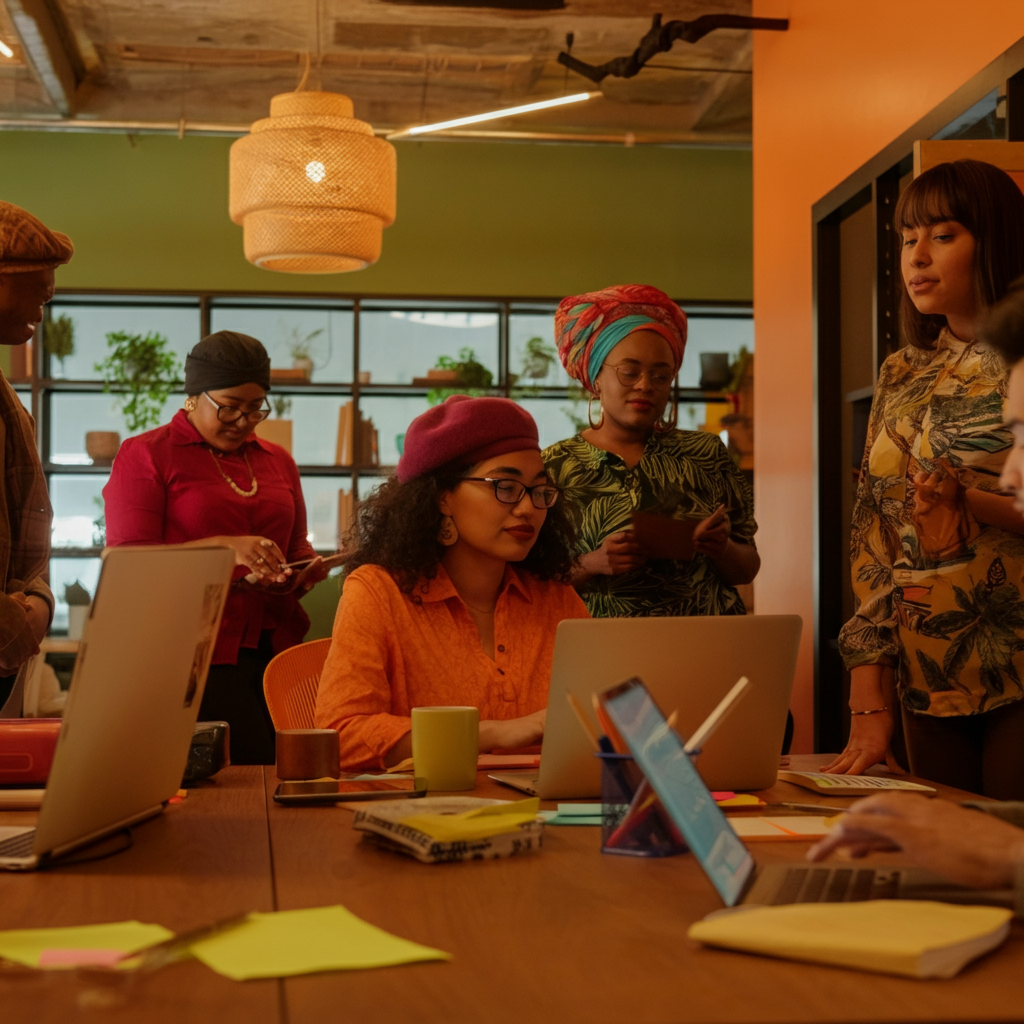
Introduction
BIPOC entrepreneurs are among the major forces transforming the entrepreneurial landscape, which is as varied as the people who drive it. Although the identities, experiences, and cultures of BIPOC (Black, Indigenous, and People of Color) people are diverse, their contributions are frequently disregarded or underappreciated. This blog delves deeply into the world of BIPOC entrepreneurs, examining their significance, difficulties, and enormous promise for the business world.
We’ll dispel myths and debates about the term, define what it means to be a BIPOC entrepreneur, and discuss the importance of their presence in the corporate world. Whether you’re a potential business owner looking for motivation, an ally, or simply inquisitive, this in-depth book will provide clarity, understanding, and motivation.

What Are BIPOC Entrepreneurs?
What Is a BIPOC Entrepreneur?
Entrepreneurs who identify as Black, Indigenous, or People of Color are known as BIPOC entrepreneurs. They represent a wide range of industries, abilities, and missions and are from a variety of racial and cultural backgrounds. These people bring distinct cultural viewpoints to the marketplace in addition to their economic contributions.
Examples of BIPOC Entrepreneurs
Entrepreneurship thrives on ingenuity and innovation, and the contributions of BIPOC entrepreneurs are evident across markets. For instance:
- Madam C.J. Walker, celebrated as the first female self-made millionaire in America, built her empire by creating hair care products for Black women.
- Daymond John, a foundational force in fashion and branding, launched FUBU, a clothing line that echoes Black culture.
- Indra Nooyi, former CEO of PepsiCo, shattered glass ceilings as a woman of color in corporate leadership.
These examples highlight the diverse industries and interests that BIPOC entrepreneurs revolutionize.
What Qualifies as a BIPOC-Owned Business?
A business must have at least 51% of its ownership, control, and operation held by people who identify as Black, Indigenous, or People of Color in order to be considered BIPOC-owned. In addition to ownership, these companies frequently advocate for equity, community support, and cultural inclusiveness.
What Does BIPOC Mean in Business?
The Role of BIPOC Entrepreneurs in Business Innovation
Business innovation is being redefined by BIPOC entrepreneurs. They develop goods, services, and brands that have a profound impact on marginalized populations by bringing in new viewpoints and filling market gaps. Their companies frequently place a high value on inclusivity and take into account the distinct demands and cultural heritage of their target markets.
For instance, BIPOC skincare entrepreneurs like Cocokind’s founder, Priscilla Tsai, concentrate on developing natural, reasonably priced products that suit a range of skin types.

Why BIPOC Ownership Matters
In business as well as other areas of society, representation is important. In addition to celebrating cultural diversity, BIPOC-owned companies help disadvantaged populations become economically empowered. When BIPOC business owners are successful, they create jobs, make community investments, and motivate the next generation.
Challenges Faced by BIPOC Entrepreneurs
Unfortunately, systemic barriers often make the entrepreneurial path more strenuous for BIPOC individuals. Challenges include:
- Access to Capital: Research indicates that as compared to their white peers, BIPOC founders obtain less funding. Equity in startup capital is still a major problem.
- Discrimination: Entering larger markets that are dominated by mainstream competitors is a challenge for many BIPOC businesses.
- Market Segmentation: In order to level the playing field, initiatives to assist BIPOC entrepreneurs—such as grants, accelerators, and networking events—are essential.
Efforts to support BIPOC entrepreneurs, such as grants, accelerators, and networking events, are crucial for leveling the playing field.
Who Is Considered BIPOC?
What Races and Ethnicities Fall Under BIPOC?
The term BIPOC aims to affirm the identities of groups often marginalized or erased in larger narratives. It stands for:
- Black (African, African American, and Caribbean individuals)
- Indigenous (Native American, Alaskan Native, or First Nations people)
- People of Color, which includes Latinx, Asian, Middle Eastern, and Pacific Islander communities among others.
How to Identify Who Qualifies as BIPOC?
When determining someone is considered BIPOC, self-identification is crucial. This concept recognizes the distinct experiences of those who have historically been marginalized and oppressed, while also including a wide range of identities.

BIPOC vs. POC: Understanding the Difference
While frequently used interchangeably, there’s a subtle distinction between the terms:
- POC (People of Color): A broad term for anyone identifying as non-white.
- BIPOC: focuses on the experiences of Indigenous and Black people, who frequently encounter certain types of prejudice. “Black” and “Indigenous” are added to highlight the unique struggles and histories of these communities.
Controversies and Alternatives to the Term BIPOC
Critics contend that the term “BIPOC” homogenizes or oversimplifies a variety of racial and ethnic groupings, sparking discussions. Some people also favor regional phrases that take cultural quirks into account.
Alternatives to BIPOC
If seeking more precise language, consider terms like:
- “People from marginalized communities”
- “Historically excluded groups”
- “Underrepresented entrepreneurs”
It’s essential to approach these conversations with respect, understanding, and a willingness to listen to individual preferences.

What Are BIPOC Founders?
Defining BIPOC Founders
BIPOC founders are people of color, Black, and Indigenous people who launch businesses or projects that are frequently based on creativity and resiliency. Their business endeavors have an impact on sectors including sustainable agriculture and technology.
Contributions of BIPOC Founders to Entrepreneurship
BIPOC founders significantly shape industries through:
- Representation: Creating businesses that reflect and serve diverse audiences.
- Innovation: Introducing solutions tailored to communities traditionally overlooked.
- Community Commitment: Often reinvesting profits into local projects or causes.
Supporting and Amplifying BIPOC Creators
For BIPOC entrepreneurs, groups like the Black Innovation Alliance and programs like Latinx Startup Weekend are essential resources. We can guarantee more equity in entrepreneurship by filling in financing gaps, establishing mentorship programs, and showcasing success stories.
The Broader Impact of BIPOC Entrepreneurs
Economic Contributions of BIPOC-Owned Businesses
In addition to making trillions of dollars in contributions to the global economy, BIPOC entrepreneurs are crucial to the growth of marginalized communities’ economies, the creation of jobs, and cultural representation.
Building Bridges for Cross-Cultural Understanding
BIPOC entrepreneurs serve as cultural ambassadors through their companies, promoting intercultural understanding and educating the general public.

Inspiring Future Generations
Aspiring leaders should draw inspiration from the prominence of prosperous BIPOC business owners, who offer tangible evidence that tenacity, creativity, and resilience can triumph over structural obstacles.
Addressing Barriers Moving Forward
While the road for BIPOC entrepreneurs remains riddled with obstacles, progress is achievable. Solutions include:
- Increased access to venture capital for underrepresented founders.
- Development of microenterprise initiatives targeting BIPOC-owned businesses.
- Amplified platforms to showcase the success stories of BIPOC entrepreneurs.
Final Thoughts and Actionable Steps
BIPOC entrepreneurs have made significant and indisputable contributions. In addition to redefining sectors, their companies create equity and representation where it is most needed. It is morally and economically necessary to acknowledge, promote, and assist their efforts.

As a BIPOC entrepreneur, you should be proud of your special ability to change the world. For supporters and allies, think about taking these actions:
- Shop from BIPOC-owned businesses.
- Advocate for diversity and inclusion at all business levels.
- Support policies and initiatives that dismantle systemic barriers for BIPOC entrepreneurs.
Together, we can cultivate a business ecosystem where everyone has an opportunity to thrive.





Leave a Reply